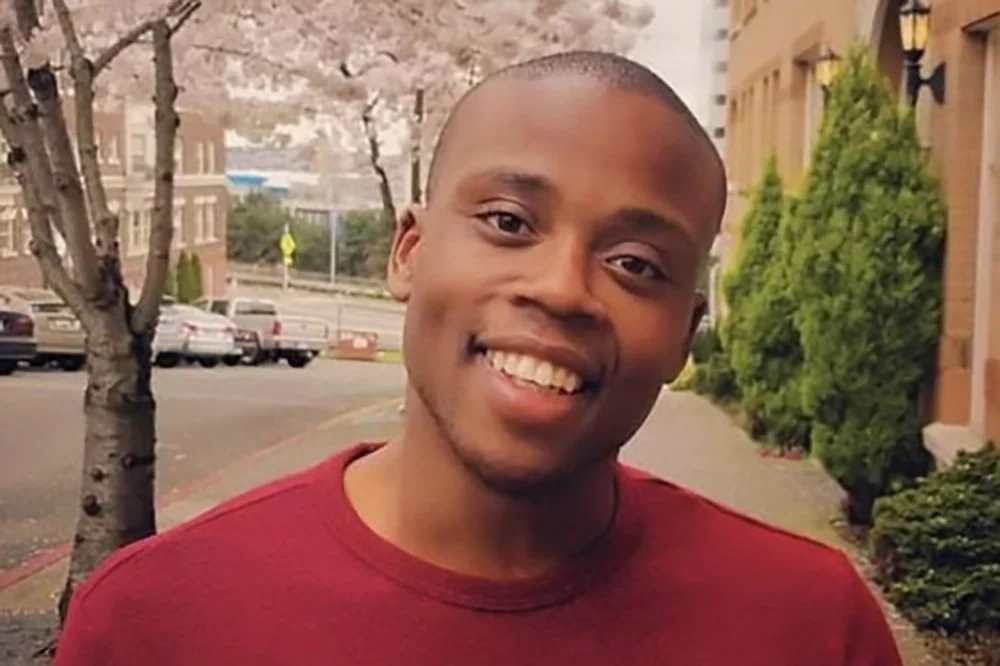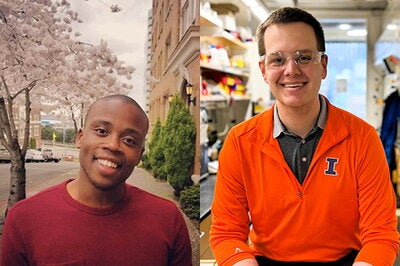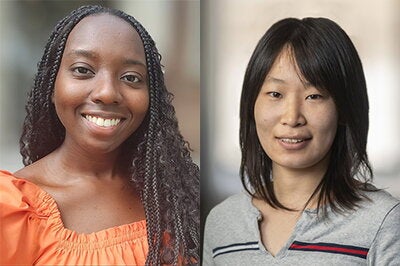
More than 40 tenure track professors are launching new careers this fall at the College of LAS, in fields from communication to astronomy and history, chemistry, economics, political science, linguistics, and many more. We caught up with a few of them to help capture the new angles of teaching and learning that have come to campus this semester.
How organizations solve problems

Communication professor Joshua-Paul Miles is a self-described Midwesterner through and through. A Milwaukee native, Miles graduated from Marquette University before attending graduate school at Northwestern and eventually returning to Marquette as a professor.
When given the chance to join the University of Illinois, however, Miles did not hesitate.
“This is one of the best research institutions in the world, right? So, when I think about that, I think about the power of research support that the university and the department provide for its faculty and that simply is unmatched,” Miles said.
Being able to work for a large land grant university like Illinois presented an opportunity different from his past experiences in private educational institutions.
“From a professional perspective, I was like, of course I want to be connected to the University of Illinois Urbana-Champaign because I know that it will allow me to have a career with a really, really big impact,” he said.
That impact is the cornerstone of Miles’ research, which focuses on interorganizational networks. His work examines how organizations collaborate to tackle complex problems and create social impact, in a way that uses theory to understand the big picture of these systems and networks and finds ways to apply that knowledge to help improve communities.
Many organizations may share the same goals, but complex problems like addressing homelessness, delivering health care to underserved communities, or ensuring access to social services for military families can be difficult for any one organization to solve on its own. Understanding how organizations share knowledge and data, create roles for leadership and governance, and support community involvement can help create holistic approaches to dealing with these challenges.
Bringing a passion for science
For Michael Strauss, this fall marks an exciting time in his career as a new assistant professor of chemistry at Illinois for many reasons, but especially because he is eager to launch his research group and blend creativity with organic and materials chemistry in order to challenge traditional approaches to materials synthesis, functionalization, and degradation.
In a world where more than 500 million metric tons of plastic is generated annually, Strauss said he wants to lead his group in thinking “outside the box” about how these materials are generated and find ways to use them once their life as a conventional plastic has ended.
“I am beyond excited to be starting this phase of my career,” said Strauss, who joined the Illinois chemistry faculty in July. “I feel like this is the time when I can be as creative as I want and identify any problem in the world I want to solve. Asking the hardest questions and thinking of ways my research team and I can solve them is incredibly stimulating.”
Strauss earned his PhD with Professor William Dichtel at Northwestern University, where he was a National Science Foundation Graduate Research Program fellow studying the supramolecular polymerization of macrocycles into high-aspect ratio nanotubes, which involved both organic and materials science.
“This certainly shaped my desire for my own research program to be an interdisciplinary blend of both organic and materials chemistry,” Strauss said.
At Illinois, Strauss hopes to use his expertise in reaction design and development to devise new synthetic approaches for polymer synthesis, functionalization, and degradation.
His research program in the Strauss Research Group will involve a lot of fundamental research but will connect the fundamental science with problems of practical importance, like finding solutions for repurposing plastic materials.

Coming home to study the planets
When Jiayin Dong walks across the University of Illinois campus this fall, it will feel familiar and entirely new.
Dong, an incoming assistant professor in the Department of Astronomy, is returning to Illinois as a faculty member, where she earned her undergraduate degrees in Engineering Physics and Astronomy. Previously a Flatiron Research Fellow at the Center for Computational Astrophysics in New York, Dong brought a passion for understanding how planetary systems form and evolve, and a deep affection for the university where she first looked through a telescope.
Dong’s path to astronomy wasn’t set from day one. “I began as a general studies major,” she recalls. “I spent my first year just exploring different courses—physics, astronomy, philosophy, engineering.” But an impromptu encounter changed everything. “One day, I walked by the observatory, and my roommate told me you could take a one-credit class. I did that and used the telescope to see the sky for the first time. Seeing pictures is much different than seeing it through the eyepiece.”
That sense of discovery stuck with her. During her undergraduate years, Dong worked on research with Professor Leslie Looney, analyzing protoplanetary disks. “It was pretty cool because I was the first person to see those images,” she says.
Returning to Illinois after earning her PhD at Penn State, Dong is eager to contribute to this fast-moving field and to help raise the university’s profile in exoplanet research. “It’s nice to bring my expertise and connections to Illinois,” she says. “I’m excited about the opportunity. Illinois is a place where I know the department and the campus pretty well. It feels like a safe place—a home.”
From mentee to mentor
Chelsey Smith is a historian of 19th century Jamaican history and her research interests include education, race, and labor in the Caribbean and Latin America. For her, the Department of History at Illinois felt like the “perfect fit” and she was impressed by the mentorship and resources we provide to junior faculty members.
On her first visit to campus, she was charmed by the similarities in the landscape between Champaign-Urbana and her hometown in Arkansas. The decision to begin her career at Illinois was a “no-brainer.”
Mentorship has played a key role in Smith’s career and the mentors she’s had throughout her life guided her on her path to becoming a historian. This past summer, she had the opportunity to meet key historians in her field at the Association of Caribbean History Conference, where she presented a paper about formal and informal teaching and learning in Jamaica during the 19th century. It was a pivotal moment in her career that solidified the importance of her work researching the history of education in the Caribbean and energized her to give that encouragement back to her students.
“Some of the most important historians in the field of Caribbean history were there. And they were all so down to earth, so easy to talk to, and very encouraging of the young scholars,” she said. “It made me even more excited for this work because you realize so many people care just as much as you and they want to see you succeed. And I can’t wait to start pouring that back into the students. I’m really looking forward to teaching so I can also start making those relationships with students here.”
Smith is also working on an article about cholera in Jamaica in the 1850s and revising her dissertation into a book. Her first article, “What is for me is not for my Master,” focusing on land and labor in the apprenticeship period in Jamaica, was published last year in the New West Indian Guide.
A full list of the new tenure track professors follows:
Assistant professors
Eric Chen, mathematics
Feng Chi, economics
Amanda Cortez, anthropology
Jiayin Dong, astronomy
Matthew Doremus, entomology
Morgan Foy, economics
Gabriela Garcia, English
Eduardo Manuel Garcia-Molina, classics
Tayzhaun Glover, history
Alisa Hardy, communication
Belinda Qian He, East Asian Languages and Cultures
Brittany Hearne, sociology
Mayuko Isomura, chemistry
Yue Lin, geography and geographic information science
Jingnan Liu, economics
Kimberly Long, psychology
Xiaotang Lu, chemistry
Joshua-Paul Miles, communication
Ya Min, plant biology
Natasha Myhal, American Indian studies
Scott Nelson, linguistics
Dean Pospisil, psychology
Wei Qin, microbiology
Chelsey Renee Smith, history
Marcos Sora, economics
Adam Steel, psychology
Michael Strauss, chemistry
Yamile Ferreira Teixeira, Spanish & Portuguese
Paul Tran-Hoang, philosophy
Joseph Trujillo-Falcon, climate, meteorology and atmospheric sciences
Gabriela Corona Valencia, Latina/Latino studies
Fabricio Vasselai, political science
Rodrigo Viqueira, Spanish & Portuguese
Angelica Waner, Spanish & Portuguese
Kiana Wilkins, sociology
Cinnamon Williams, gender and women’s studies
Taiye Winful, anthropology
Associate professors
Kalani Craig, history
Brandon Jackson, sociology
Aja Martinez, Latina/Latino Studies
Professors
Stephen Finlay, philosophy
Tigga Kingston, evolution, ecology, and behavior
Tracy Lawson, plant biology